英语时间状语从句讲解和练习完整版
- 格式:doc
- 大小:171.00 KB
- 文档页数:67
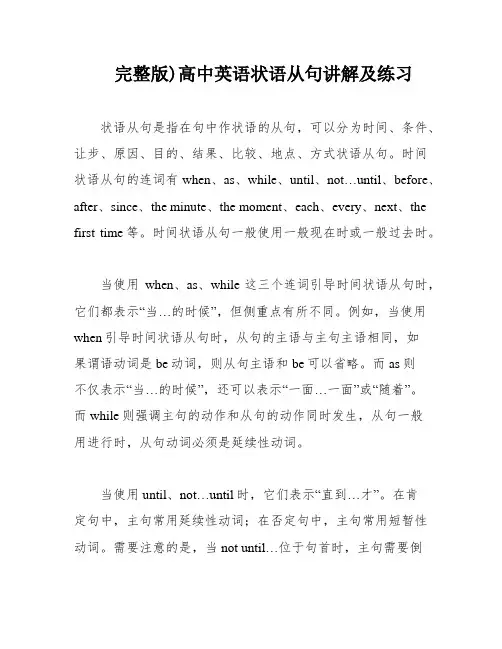
完整版)高中英语状语从句讲解及练习状语从句是指在句中作状语的从句,可以分为时间、条件、让步、原因、目的、结果、比较、地点、方式状语从句。
时间状语从句的连词有when、as、while、until、not…until、before、after、since、the minute、the moment、each、every、next、the first time等。
时间状语从句一般使用一般现在时或一般过去时。
当使用when、as、while这三个连词引导时间状语从句时,它们都表示“当…的时候”,但侧重点有所不同。
例如,当使用when引导时间状语从句时,从句的主语与主句主语相同,如果谓语动词是be动词,则从句主语和be可以省略。
而as则不仅表示“当…的时候”,还可以表示“一面…一面”或“随着”。
而while则强调主句的动作和从句的动作同时发生,从句一般用进行时,从句动词必须是延续性动词。
当使用until、not…until时,它们表示“直到…才”。
在肯定句中,主句常用延续性动词;在否定句中,主句常用短暂性动词。
需要注意的是,当not until…位于句首时,主句需要倒装。
例如,“Not until you had explained how did I manage to do it.”It was dark when he finally returned。
XXX the machine type upon seeing it。
As soon as I arrived home。
it began to rain。
Hardly had I arrived home when it began to rain。
XXX: real XXX: if。
even if/though。
unless/if。
not。
as long as/so long as。
as far as/so far as。
provided/providing(that)。
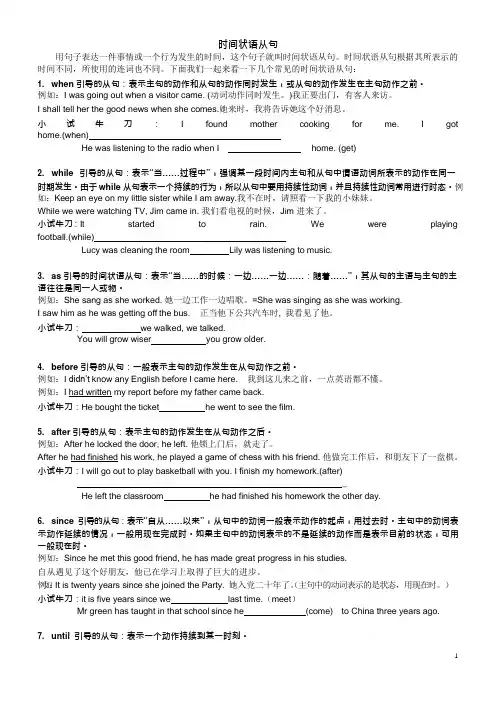
时间状语从句用句子表达一件事情或一个行为发生的时间,这个句子就叫时间状语从句。
时间状语从句根据其所表示的时间不同,所使用的连词也不同。
下面我们一起来看一下几个常见的时间状语从句:1. when 引导的从句:表示主句的动作和从句的动作同时发生,或从句的动作发生在主句动作之前。
例如:I was going out when a visitor came. (动词动作同时发生。
)我正要出门,有客人来访。
I shall tell her the good news when she comes.她来时,我将告诉她这个好消息。
小试牛刀:I found mother cooking for me. I got home.(when)He was listening to the radio when I home. (get)2. while 引导的从句:表示“当……过程中”,强调某一段时间内主句和从句中谓语动词所表示的动作在同一时期发生。
由于while 从句表示一个持续的行为,所以从句中要用持续性动词,并且持续性动词常用进行时态。
例如:Keep an eye on my little sister while I am away.我不在时,请照看一下我的小妹妹。
While we were watching TV, Jim came in. 我们看电视的时候,Jim 进来了。
小试牛刀:It started to rain. We were playing football.(while)Lucy was cleaning the room Lily was listening to music.3. as 引导的时间状语从句:表示“当……的时候;一边……一边……;随着……”,其从句的主语与主句的主语往往是同一人或物。
例如:She sang as she worked. 她一边工作一边唱歌。
=She was singing as she was working.I saw him as he was getting off the bus. 正当他下公共汽车时, 我看见了他。
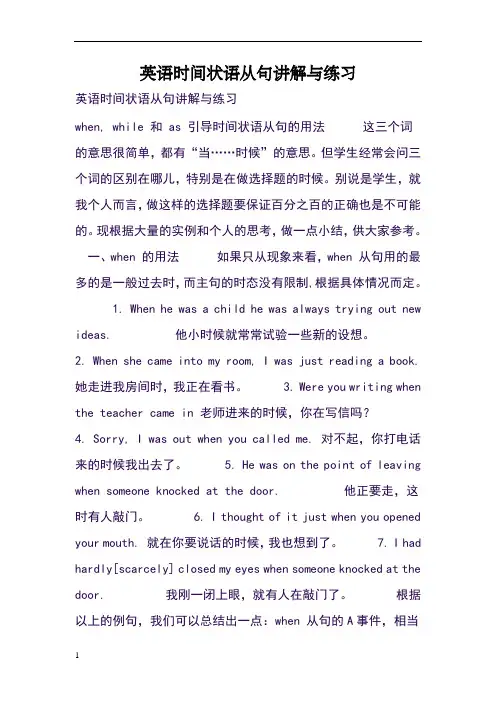
英语时间状语从句讲解与练习英语时间状语从句讲解与练习when, while 和 as 引导时间状语从句的用法这三个词的意思很简单,都有“当……时候”的意思。
但学生经常会问三个词的区别在哪儿,特别是在做选择题的时候。
别说是学生,就我个人而言,做这样的选择题要保证百分之百的正确也是不可能的。
现根据大量的实例和个人的思考,做一点小结,供大家参考。
一、when 的用法如果只从现象来看,when 从句用的最多的是一般过去时,而主句的时态没有限制,根据具体情况而定。
1. When he was a child he was always trying out new ideas. 他小时候就常常试验一些新的设想。
2. When she came into my room, I was just reading a book. 她走进我房间时,我正在看书。
3. Were you writing when the teacher came in 老师进来的时候,你在写信吗?4. Sorry, I was out when you called me. 对不起,你打电话来的时候我出去了。
5. He was on the point of leaving when someone knocked at the door. 他正要走,这时有人敲门。
6. I thought of it just when you opened your mouth. 就在你要说话的时候,我也想到了。
7. I had hardly[scarcely] closed my eyes when someone knocked at the door. 我刚一闭上眼,就有人在敲门了。
根据以上的例句,我们可以总结出一点:when 从句的A事件,相当于另一个事件B发生的时间点。
也就是说,when 从句的重点不在动作本身发生的状态,而只是把它作为一个时间点,所以when 多数情况下用的是一般过去时,则不用正在进行时。
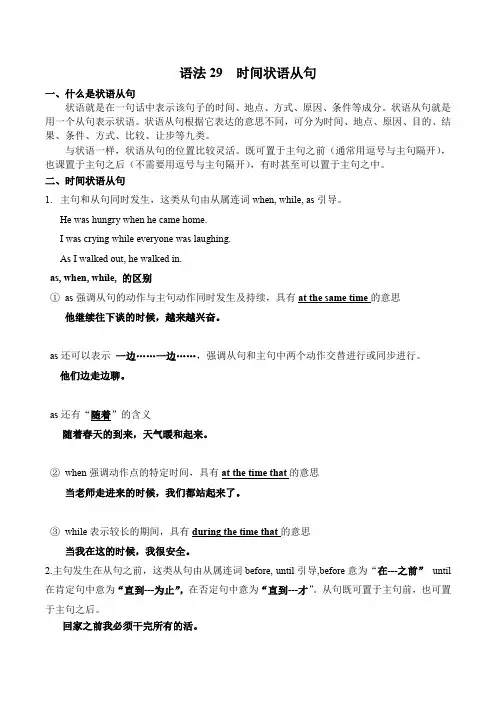
语法29 时间状语从句一、什么是状语从句状语就是在一句话中表示该句子的时间、地点、方式、原因、条件等成分。
状语从句就是用一个从句表示状语。
状语从句根据它表达的意思不同,可分为时间、地点、原因、目的、结果、条件、方式、比较、让步等九类。
与状语一样,状语从句的位置比较灵活。
既可置于主句之前(通常用逗号与主句隔开),也课置于主句之后(不需要用逗号与主句隔开),有时甚至可以置于主句之中。
二、时间状语从句1.主句和从句同时发生,这类从句由从属连词when, while, as引导。
He was hungry when he came home.I was crying while everyone was laughing.As I walked out, he walked in.as, when, while, 的区别①as强调从句的动作与主句动作同时发生及持续,具有at the same time的意思他继续往下谈的时候,越来越兴奋。
as还可以表示一边……一边……,强调从句和主句中两个动作交替进行或同步进行。
他们边走边聊。
as还有“随着”的含义随着春天的到来,天气暖和起来。
②when强调动作点的特定时间,具有at the time that的意思当老师走进来的时候,我们都站起来了。
③while表示较长的期间,具有during the time that的意思当我在这的时候,我很安全。
2.主句发生在从句之前,这类从句由从属连词before, until引导,before意为“在---之前”until 在肯定句中意为“直到---为止”,在否定句中意为“直到---才”。
从句既可置于主句前,也可置于主句之后。
回家之前我必须干完所有的活。
我们将一直等到他回来。
他直到晚上11点才回家。
3.主句发生在从句之后,这类从句由从属连词after引导,意为“在---之后”。
从句既可置于主句前,也可置于主句之后。
放学后我们踢足球吧。
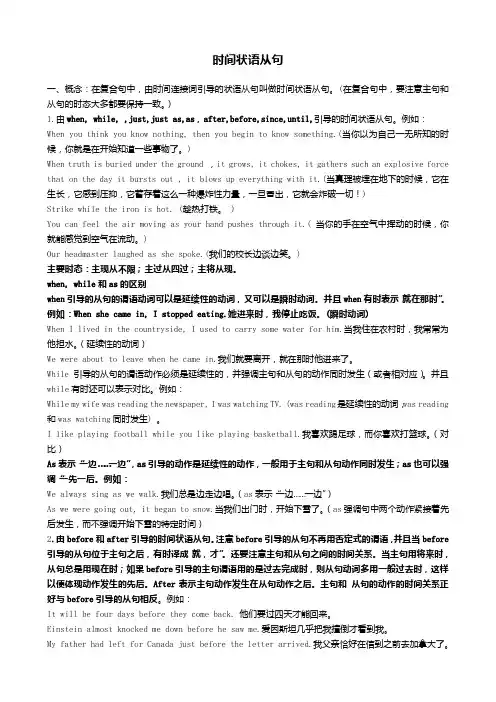
时间状语从句一、概念:在复合句中,由时间连接词引导的状语从句叫做时间状语从句。
(在复合句中,要注意主句和从句的时态大多都要保持一致。
)1.由when, while, ,just,just as,as,after,before,since,until,引导的时间状语从句。
例如:When you think you know nothing, then you begin to know something.(当你以为自己一无所知的时候,你就是在开始知道一些事物了。
)When truth is buried under the ground ,it grows, it chokes, it gathers such an explosive force that on the day it bursts out , it blows up everything with it.(当真理被埋在地下的时候,它在生长,它感到压抑,它蓄存着这么一种爆炸性力量,一旦冒出,它就会炸破一切!)Strike while the iron is hot. (趁热打铁。
)You can feel the air moving as your hand pushes through it.( 当你的手在空气中挥动的时候,你就能感觉到空气在流动。
)Our headmaster laughed as she spoke.(我们的校长边谈边笑。
)主要时态:主现从不限;主过从四过;主将从现。
when, while和as的区别when引导的从句的谓语动词可以是延续性的动词,又可以是瞬时动词。
并且when有时表示“就在那时”。
例如:When she came in, I stopped eating.她进来时,我停止吃饭。
(瞬时动词)When I lived in the countryside, I used to carry some water for him.当我住在农村时,我常常为他担水。
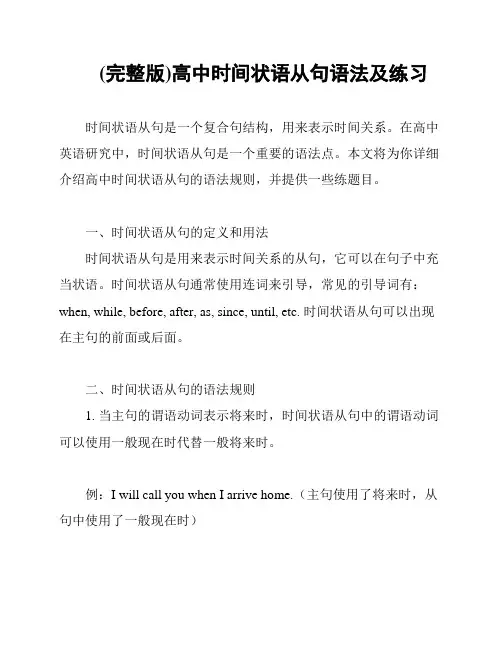
(完整版)高中时间状语从句语法及练习时间状语从句是一个复合句结构,用来表示时间关系。
在高中英语研究中,时间状语从句是一个重要的语法点。
本文将为你详细介绍高中时间状语从句的语法规则,并提供一些练题目。
一、时间状语从句的定义和用法时间状语从句是用来表示时间关系的从句,它可以在句子中充当状语。
时间状语从句通常使用连词来引导,常见的引导词有:when, while, before, after, as, since, until, etc. 时间状语从句可以出现在主句的前面或后面。
二、时间状语从句的语法规则1. 当主句的谓语动词表示将来时,时间状语从句中的谓语动词可以使用一般现在时代替一般将来时。
例:I will call you when I arrive home.(主句使用了将来时,从句中使用了一般现在时)2. 当主句的谓语动词表示过去时,时间状语从句中的谓语动词可以使用一般过去时或过去完成时代替。
例:She had finished her homework before she went to bed.(主句使用了过去时,从句中使用了过去完成时)3. 当时间状语从句表示一个惯性的动作或一个客观事实时,从句中的谓语动词可以使用一般现在时。
例:I always go for a walk when it is sunny.(从句中表示惯性的动作)三、时间状语从句的练题目1. 选择正确的连词填空:― She fell asleep _______ she finished her book.1) while 2) because 3) after― We will start the meeting _______ everyone ar rives.1) before 2) since 3) until2. 改写句子,将主句的谓语动词改为表示将来时:― I will call you when I have time.3. 改写句子,将主句的谓语动词改为表示过去时或过去完成时:― He went to bed before he finished his work.以上是关于高中时间状语从句的语法规则及练习题目的详细介绍。
![高中时间状语从句和练习[含答案解析]](https://uimg.taocdn.com/ebd3a8f8d05abe23482fb4daa58da0116c171f22.webp)
高中时间状语从句和练习[含答案解析]状语从句状语从句在句中作状语,修饰主句中的动词、形容词或副词等。
状语从句放在主句之前时,常用逗号分开;放在主句之后,一般不用逗号。
状语从句按其意义和作用可分为时间、原因、地点、条件、让步、目的、结果、方式、比较等9种。
1.时间状语从句时间状语从句表示主句动作发生的时间,主要由when,while,as ; before, after; till (until); once, by the time, as soon as, no sooner ... than和hardly ... when及名词词组the moment等引导。
1) when“在……的时候”; while “在……期间”; as “正当……的时候”when意为“在……的时候”,强调“特定时间”。
When spring came, he felt like a trip.When he was eating his breakfast, he heard the doorbell ring.说明:连词when在状语从句中还有如下几种含义:①表示突然发生的事,含义为“(正在……时)忽然”。
I was just coming along to see you when I ran into Wilson.I had been working a couple of months when I had a letter from Jane.②表示过早发生某事,意为“(还没……)就”。
此含义有时可用before代替。
I hadn’t been rea ding for half an hour when I heard steps outside.我刚读了不到半个小时就听到外面有脚步声。
I had been there little more than a week when I set to work in earnest.③表示“在……的情况下”,常可译为“虽然”,“既然”,“如果”。
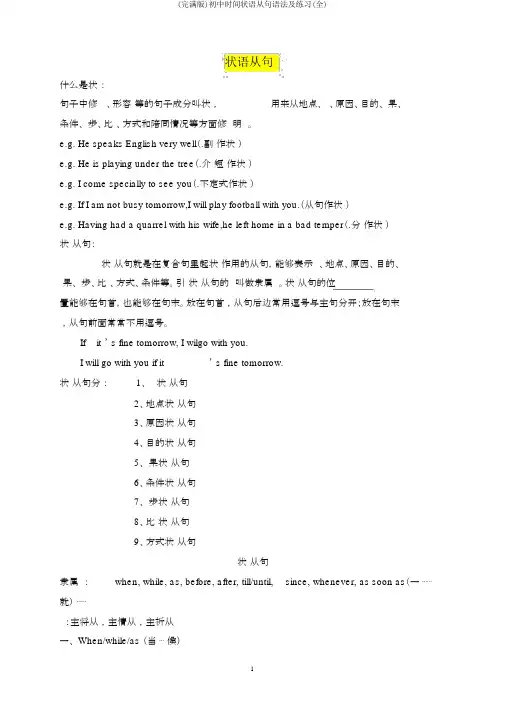
状语从句什么是状:句子中修、形容等的句子成分叫状,用来从地点、、原因、目的、果、条件、步、比、方式和陪同情况等方面修明。
e.g. He speaks English very well(.副作状)e.g. He is playing under the tree(.介短作状)e.g. I come specially to see you(.不定式作状)e.g. If I am not busy tomorrow,I will play football with you.(从句作状)e.g. Having had a quarrel with his wife,he left home in a bad temper(.分作状)状从句:状从句就是在复合句里起状作用的从句,能够表示、地点、原因、目的、果、步、比、方式、条件等。
引状从句的叫做隶属。
状从句的位置能够在句首,也能够在句末。
放在句首,从句后边常用逗号与主句分开;放在句末,从句前面常常不用逗号。
If it ’ s fine tomorrow, I wilgo with you.I will go with you if it’ s fine tomorrow.状从句分:1、状从句2、地点状从句3、原因状从句4、目的状从句5、果状从句6、条件状从句7、步状从句8、比状从句9、方式状从句状从句隶属:when, while, as, before, after, till/until, since, whenever, as soon as(一⋯⋯就)⋯⋯:主将从,主情从,主祈从一、 When/while/as (当⋯候)区:主句作与从句作生的(同/以前 /此后);从句(延性 /瞬性)1)When:when 引状从句表示“当⋯⋯ 的候”,when既能够指段也可指点,从句中既可用延性又可用瞬性,且作既可和主句的作同生又可在主句的作以前或此后生。
且when 引的状从句中一般用一般在表将来(主将从)。
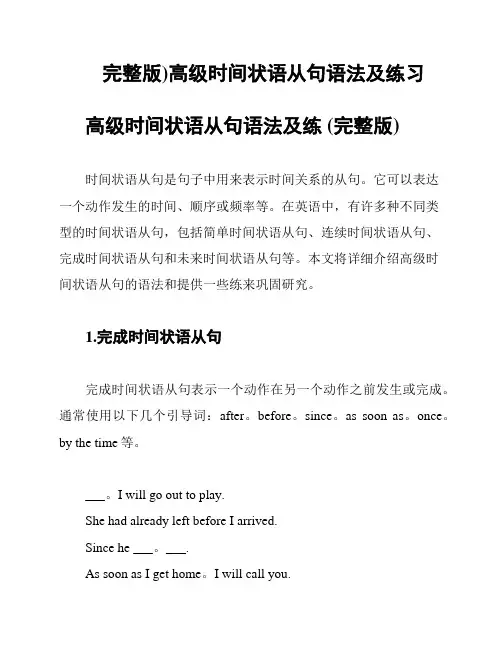
完整版)高级时间状语从句语法及练习高级时间状语从句语法及练 (完整版)时间状语从句是句子中用来表示时间关系的从句。
它可以表达一个动作发生的时间、顺序或频率等。
在英语中,有许多种不同类型的时间状语从句,包括简单时间状语从句、连续时间状语从句、完成时间状语从句和未来时间状语从句等。
本文将详细介绍高级时间状语从句的语法和提供一些练来巩固研究。
1.完成时间状语从句完成时间状语从句表示一个动作在另一个动作之前发生或完成。
通常使用以下几个引导词:after。
before。
since。
as soon as。
once。
by the time等。
___。
I will go out to play.She had already left before I arrived.Since he ___。
___.As soon as I get home。
I will call you.Once you understand the concept。
it es easier.By the time he arrives。
the meeting will have already started.2.未来时间状语从句未来时间状语从句表示一个将来发生的动作或情况。
常用的引导词包括:when。
as soon as。
once。
until。
unless等。
When you come to the party。
please bring a gift.I will call you as soon as ___.Once you finish the project。
you can take a break.I won't go to bed until I finish reading this book.I won't go unless you come with me.3.连续时间状语从句连续时间状语从句表示两个动作或情况在时间上的连续关系。
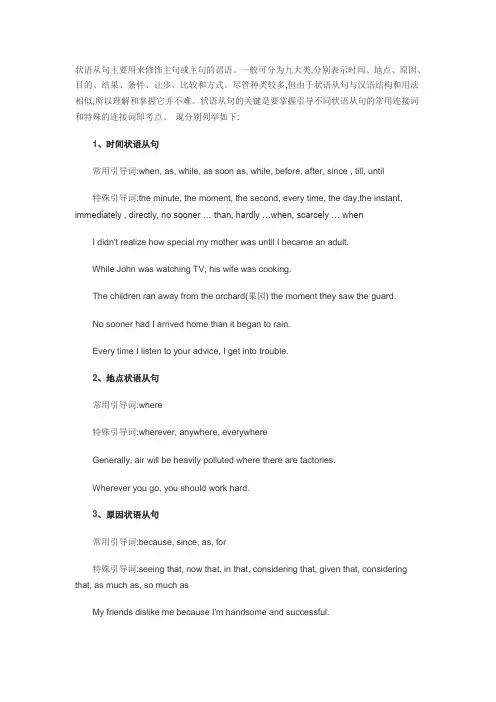
状语从句主要用来修饰主句或主句的谓语。
一般可分为九大类,分别表示时间、地点、原因、目的、结果、条件、让步、比较和方式。
尽管种类较多,但由于状语从句与汉语结构和用法相似,所以理解和掌握它并不难。
状语从句的关键是要掌握引导不同状语从句的常用连接词和特殊的连接词即考点。
现分别列举如下:1、时间状语从句常用引导词:when, as, while, as soon as, while, before, after, since , till, until特殊引导词:the minute, the moment, the second, every time, the day,the instant, immediately , directly, no sooner … than, hardly …when, scarcely … whenI didn't realize how special my mother was until I became an adult.While John was watching TV, his wife was cooking.The children ran away from the orchard(果园) the moment they saw the guard.No sooner had I arrived home than it began to rain.Every time I listen to your advice, I get into trouble.2、地点状语从句常用引导词:where特殊引导词:wherever, anywhere, everywhereGenerally, air will be heavily polluted where there are factories.Wherever you go, you should work hard.3、原因状语从句常用引导词:because, since, as, for特殊引导词:seeing that, now that, in that, considering that, given that, considering that, as much as, so much asMy friends dislike me because I'm handsome and successful.Now that everybody has come, let's begin our conference.The higher income tax is harmful in that it may discourage people from trying to earn more.Considering that he is no more than 12 years old, his height of 1.80 m is quite remarkable.4、目的状语从句常用引导词:so that, in order that特殊引导词:lest, in case, for fear that,in the hope that, for the purpose that, to the end thatThe boss asked the secretary to hurry up with the letters so that he could sign them.The teacher raised his voice on purpose that the students in the back could hear more clearly.5、结果状语从句常用引导词:so that, so… that, such … that,特殊引导词:such that, to the degree that, to the extent that, to such a degree that, He got up so early that he caught the first bus.It's such a good chance that we must not miss it.To such an degree was he excited that he couldn't sleep last night.6、条件状语从句常用引导词:if, unless,特殊引导词:as/so long as, only if, providing/provided that, suppose that, in case that, on condition thatWe'll start our project if the president agrees.You will certainly succeed so long as you keep on trying.Provided that there is no opposition, we shall hold the meeting here.7、让步状语从句常用引导词:though, although, even if, even though特殊引导词: as(用在让步状语从句中必须要倒装),while ( 一般用在句首),no matter …, in spite of the fact that, while, whatever, whoever, wherever, whenever, however, whicheverMuch as I respect him, I can't agree to his proposal.尽管我很尊敬他, 我却不同意他的建议。
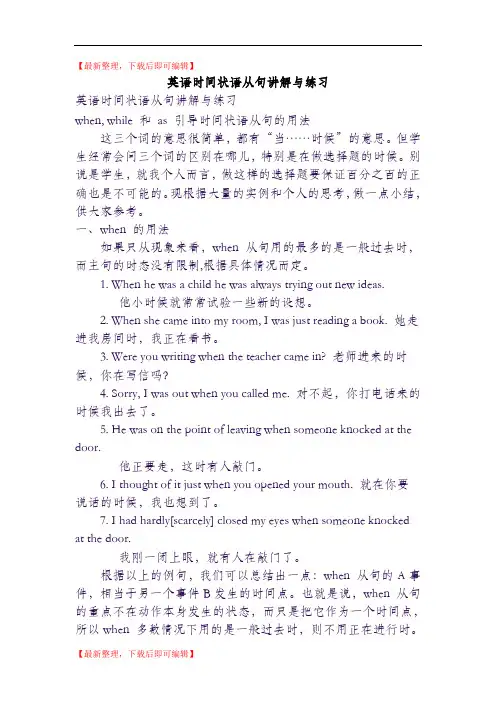
【最新整理,下载后即可编辑】英语时间状语从句讲解与练习英语时间状语从句讲解与练习when, while 和as 引导时间状语从句的用法这三个词的意思很简单,都有“当……时候”的意思。
但学生经常会问三个词的区别在哪儿,特别是在做选择题的时候。
别说是学生,就我个人而言,做这样的选择题要保证百分之百的正确也是不可能的。
现根据大量的实例和个人的思考,做一点小结,供大家参考。
一、when 的用法如果只从现象来看,when 从句用的最多的是一般过去时,而主句的时态没有限制,根据具体情况而定。
1. When he was a child he was always trying out new ideas.他小时候就常常试验一些新的设想。
2. When she came into my room, I was just reading a book. 她走进我房间时,我正在看书。
3. Were you writing when the teacher came in? 老师进来的时候,你在写信吗?4. Sorry, I was out when you called me. 对不起,你打电话来的时候我出去了。
5. He was on the point of leaving when someone knocked at the door.他正要走,这时有人敲门。
6. I thought of it just when you opened your mouth. 就在你要说话的时候,我也想到了。
7. I had hardly[scarcely] closed my eyes when someone knocked at the door.我刚一闭上眼,就有人在敲门了。
根据以上的例句,我们可以总结出一点:when 从句的A事件,相当于另一个事件B发生的时间点。
也就是说,when 从句的重点不在动作本身发生的状态,而只是把它作为一个时间点,所以when 多数情况下用的是一般过去时,则不用正在进行时。
状语从句状语从句在句中作状语,可分为:时间、条件、让步、原因、目的、结果、比较、地点、方式状语从句。
一、时间状语从句弓丨导时间状语从句的连词有:whe n, as, while, un til, not …un til, before, after, sin ce, the minute,the moment, each( every, next, the first) time 等。
时间状语从句中一般用一般现在时或一般过去时。
1. When , while, as都可解释为"当'、'的时候”但侧重点有所不同。
1) WhenEg: When I arrived home , I had a little rest.注意点:when从句的主语与主句主语相同,谓语动词是be动词时,从句主语和be可以省略。
Eg: When (she was) walking along the street, she met her class teacher.2) AsAs 除了表示“当'''的时候”,还可表示为“一面'''一面”,“随着”Eg: He sang as he danced.一面'''一面)You will grow wiser as you grow older.( 随着)3) While 表示“当'''的时候” 强调主句的动作和从句的动作同时发生,从句一般用进行时,从句动词必须是延续性动词。
Eg: While we were working, they were having a rest.While (they were) having a discussion, they got very confused.注意点:while 有对比的含义,解释为“然而” 。
eg: I prefer black tee, while he likes coffee.2. until, not…until表示"直到'、'才”,在肯定句中主句常用延续性动词;在否定句中主句常用短暂性动词。
(完整版)职场时间状语从句语法及练习一、语法介绍时间状语从句是一个从句,用于描述一个动作或事件发生的时间或条件。
它通常以连接词引导,主要分为以下几种类型:1. 当时间状语从句说明一个动作或事件与主句动作同时发生或持续发生时,请使用"when" 或 "while" 连接词。
- 例如:"When I arrived at the office, my colleague was already there."2. 当时间状语从句说明一个动作或事件发生在主句动作之前时,请使用"before" 连接词。
- 例如:"Before the meeting starts, make sure to review your presentation."3. 当时间状语从句说明一个动作或事件发生在主句动作之后时,请使用"after" 连接词。
- 例如:"After I finish this report, I will take a break."4. 当时间状语从句说明一个动作或事件发生在主句动作的一段时间之后时,请使用"after" 连接词加上一段时间状语词。
5. 当时间状语从句说明一个动作或事件发生在主句动作的一段时间之前,请使用"before" 连接词加上一段时间状语词。
- 例如:"Before you leave the office, remember to turn off the lights."二、练题请根据句子的意思,填写适当的时间状语从句。
1. _________ you finish the report, please send it to me.2. I will call you back _________ I have a break.3. _________ she arrived at the office, the meeting had already started.4. Make sure to finish the tasks _________ the end of the day.5. _________ he left the office, he locked the door.答案:1. When2. when3. When4. by5. Before。
状语从句状语从句用来修饰主句中的动词,副词和形容词的从句叫状语从句.根据其含义状语从句可分为时间状语从句,地点状语从句,条件状语从句,原因状语从句,结果状语从句,比较状语从句,目的状语从句,让步状语从句。
1. 时间状语从句(1)时间状语从句常用when, as, while, before, after, since, till, until, as soon as等连词来引导。
例如:It was raining hard(rain hard 下大雨) when got to school yesterday.While he was doing his homework, the telephone rang。
As he walked along(沿着走) the lake, he sang happily。
He had learned a little Chinese before he came to China.After he finished middle school, he went to work in a factory.(2)在时间状语从句里,通常不用将来时态,用现在时态表示将来的动作或状态.例如:I’ll ring you up as soon as I get to New York.I will tell him everything when he comes back。
He won't believe it until he sees it with his own eyes。
(3)在带有till或until引导的时间状语从句的主从复合句里,如果主句用肯定式,其含义是“一直到……时”,谓语动词只能用延续性动词。
如果主句用否定式,其含义是“直到……才……”, “在……以前不……”,谓语动词可用瞬间动词。
例如:The young man read till the light went out(熄灭)。
英语时间状语从句讲解与练习英语时间状语从句讲解与练习when, while 和 as 引导时间状语从句的用法这三个词的意思很简单,都有“当……时候”的意思。
但学生经常会问三个词的区别在哪儿,特别是在做选择题的时候。
别说是学生,就我个人而言,做这样的选择题要保证百分之百的正确也是不可能的。
现根据大量的实例和个人的思考,做一点小结,供大家参考。
一、when 的用法如果只从现象来看,when 从句用的最多的是一般过去时,而主句的时态没有限制,根据具体情况而定。
1. When he was a child he was always trying out new ideas.他小时候就常常试验一些新的设想。
2. When she came into my room, I was just reading a book. 她走进我房间时,我正在看书。
3. Were you writing when the teacher came in? 老师进来的时候,你在写信吗?4. Sorry, I was out when you called me. 对不起,你打电话来的时候我出去了。
5. He was on the point of leaving when someone knocked at the door.他正要走,这时有人敲门。
6. I thought of it just when you opened your mouth. 就在你要说话的时候,我也想到了。
7. I had hardly[scarcely] closed my eyes when someone knocked at the door.我刚一闭上眼,就有人在敲门了。
根据以上的例句,我们可以总结出一点:when 从句的A事件,相当于另一个事件B发生的时间点。
也就是说,when 从句的重点不在动作本身发生的状态,而只是把它作为一个时间点,所以when 多数情况下用的是一般过去时,则不用正在进行时。
专题: 时间状语从句在下列空格中填入适当连词。
1._________he comes tomorrow,I will ask where he has been.2._________he was speaking,everybody listened carefully.3.I saw her just now_________she was getting off the train.4.Have a good look at that man________you pass him.5.It was already eight o'clock_________we got there.6.I was about to go out_________a visitor came.7.We'll go to the country at the beginning of June,_________the summer harvest will start.8.He learned to speak German_________he was in Berlin.9.Henry is in charge of the office________Mr.Smith is away.10.I listen to the recorder_________I have time.11.He had learned Chinese_________he came to China.12._________the work was done,we sat down to sum up experience.13.I haven't seen him_________he moved to the other side of the town.14.I waited________ he came back.15.I didn’t recognize him________he took off his eyeglasses.16.She likes everything to be in place________she starts to work.17.The thieves ran away_________they caught sight of the police.18.They decided to go back home_________their money ran out.19.__________I get to the airport,I will phone you to pick me up.20.They were about to leave______it began to rain.Keys:1.When2.While/When3.as4.when/as5.when6.when7.when8.while9.whi le10.whenever11.before12.After13.since14.till/until15.until16.before17.as soon as18.before19.As soon as20.when。
英语时间状语从句讲解与练习英语时间状语从句讲解与练习when, while 和 as 引导时间状语从句的用法这三个词的意思很简单,都有“当……时候”的意思。
但学生经常会问三个词的区别在哪儿,特别是在做选择题的时候。
别说是学生,就我个人而言,做这样的选择题要保证百分之百的正确也是不可能的。
现根据大量的实例和个人的思考,做一点小结,供大家参考。
一、when 的用法如果只从现象来看,when 从句用的最多的是一般过去时,而主句的时态没有限制,根据具体情况而定。
1. When he was a child he was always trying out new ideas.他小时候就常常试验一些新的设想。
2. When she came into my room, I was just reading a book. 她走进我房间时,我正在看书。
3. Were you writing when the teacher came in? 老师进来的时候,你在写信吗?4. Sorry, I was out when you called me. 对不起,你打电话来的时候我出去了。
5. He was on the point of leaving when someone knocked at the door.他正要走,这时有人敲门。
6. I thought of it just when you opened your mouth. 就在你要说话的时候,我也想到了。
7. I had hardly[scarcely] closed my eyes when someone knocked at the door.我刚一闭上眼,就有人在敲门了。
根据以上的例句,我们可以总结出一点:when 从句的A事件,相当于另一个事件B发生的时间点。
也就是说,when 从句的重点不在动作本身发生的状态,而只是把它作为一个时间点,所以when 多数情况下用的是一般过去时,则不用正在进行时。
因为如果用正在进行时,它表示的就是一段时间而不是一个时间点了。
根据这一点,有的文章补充说:when 从句的动词大多是瞬时动词。
这种说法也可以参照。
实际上,when 从句也可以有其它的时态,但几乎也不用进行时,因为它也只是作为一个时间参照点。
例如:1. When I got to the airport, the guests had left. 当我赶到飞机场时,客人们已经离开了。
2. When he had finished his homework, he took a short rest.当他完成作业后,他休息了一会儿。
3. Why do you want a new job when you have got such a good one already?你已经找到如此好的工作,为何还想再找新的?4. You shall borrow the book when I have finished reading it.在我读完这本书后,你可以借阅。
5. When the manager comes here for a visit next week, I’ll talk with him about this.下周,经理来这参观时,我会和他谈谈此事。
二、while 的用法相比于when 来说,while 从句的侧重点就不一样了。
while 从句的侧重点在于描述动作正在发生的状态,它的意思是:当while 事件正在发生的时候,另一件事如何如何。
所以,while 从句一般用的是正在进行时。
而另一件事的状态没有硬性的要求,根据具体情况而定。
例如:1. While my wife was reading the newspaper, I was watching TV.当妻子正在看报纸的时候,我正在看电视。
2. While Jim was mending his bike, Lin Tao came to see him.正当吉姆修自行车时,林涛来看他。
3. While they were talking, the bell rang. 正在他们谈话的时候,上课铃响了。
4. You can’t do your homework while you’re watching TV.你不能一边看电视一边做家庭作业。
5. While John was sitting biting his nails, I was working out a plan to get us home.约翰坐在那里咬指甲时,我正在制定一个回家的计划。
从时间的角度来看,while 表示的是一段时间,是一个过程。
这是while 的侧重点。
因此,如果含有“一段时间”的含义的时候,就可以用while。
6. Strike while the iron is hot. 趁热打铁。
这句话中,是说趁着铁是热的这段时间,赶紧打铁。
如果换成 when 意思就变了,相当于说铁只热了一下,打一下,然后铁就冷了。
这显然不符合文意。
再例:—I'm going to the post office.—While you're there, can you get me some stamps?三、as 的用法as 从句表示的也是一件事情正在发生,另一件事也正在进行当中。
但与 while 从句不同的是,as 从句用的一般不用正在进行时,而只是一般过去时。
as 从句一般可以翻译成“边……边……”。
例如:1. As my mother sang those old songs, tears ran down her cheeks.当我妈妈唱起那些老歌时,眼泪顺着她的脸颊流了下来。
2. The students took notes as they listened. 学生们边听课边做笔记。
3. As we talked on, he got more and more excited. 我们继续往下谈的时候,他越来越兴奋。
4. The little girls sang as they went. 小姑娘们一边走,一边唱。
5. Just as he caught the ball, there was a tearing sound.当他抓住球的时候,有一种撕裂的声音。
as 表达的事件,往往只是主句动作发生的背景或条件时,as 只是一个次要的时间说明,不像while 从句有强调 while 动作本身的意思。
因此,as 常常翻译成“随着……”之意。
例如:1. As the time went on,the weather got worse. 随着时间的推移,气候更加糟糕。
2. The atmosphere gets thinner and thinner as the height increases.随着高度的增加,大气越来越稀薄。
3. As years go by,China is getting stronger and richer.随着时间一年一年过去,中国变得越来越富强了。
少数情况下,如果强调动作正在发生,as 从句也可以用正在进行时。
这只能算是特例了。
1. The sad mother sat on the roadside, shouting as she was crying.伤心的妈妈坐在路边,边哭边叫喊。
2. As we were going out, it began to snow. 正当我们出门时,雪开始下起来。
3. He came in as I was going to bed. 我正要上床睡觉,他进来了。
四、when, while, as 的互换如果从句动作和主句动作同时发生,并且从句动作为延续性动词时,when,while,as 可以互换使用。
这种情况下,它们的细微区别恐怕连英、美人自己也说不清了。
1. When /While /As we were dancing, a stranger came in.当我们跳舞时,一位陌生人走了进来。
[dance 为延续性动词]2. When /While /As she was making a phone call, I was writing a letter.当她在打电话时,我正在写信。
[make为延续性动词]3. While/When/ As I was walking down the street, Inoticed a police car in front of thebank.我顺着马路往前走时,发现银行门前停着一辆警车。
五、比较while, when, as1)as, when 引导短暂性动作的动词。
例如:Just as / Just when / When I stopped my car, a man came up to me.我刹车后,有一个人向我走来。
2)当从句的动作发生于主句动作之前,只能用when 引导这个从句,不可用as 或 while。
例如:When you have finished your work, you may have a rest.干完活后,你可以休息一下。
3)从句表示“随时间推移”连词能用as,不用when 或while。
例如: As the day went on, the weather got worse. 日子一天天过去,天气越变越坏。
2)比较until和till此两个连词意义相同。
肯定形式表示的意思是“做某事直至某时”,动词必须是延续性的。
否定形式表达的意思是“直至某时才做某事”。
动词为延续性或非延续性都可以。
正确使用这两个连词的关键之一就在于判断句中的动词该用肯定式还是否定式。
肯定句:I slept until midnight. 我一直睡到半夜时醒了。
Wait till I call you. 等着我叫你。
(在肯定句中可用before代替。
例如:Let's get in the wheat before the sun sets.)否定句:She didn't arrive until 6 o'clock. 她直到6点才到。
Don't get off the bus until it has stopped. 公共汽车停稳后再下车。
I didn't manage to do it until you had explained how. 直到你教我后,我才会做。
区别:1)until可用于句首,而till通常不用于句首。
例如:Until you told me, I had heard nothing of what happened.直到你告诉我以前,出了什么事我一点也不知道。